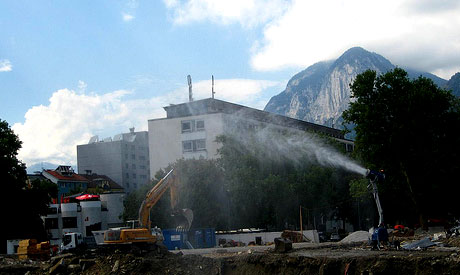
The Multi-Ethnic Study of Atherosclerosis and Air Pollution (MESA Air) conducted by the University of Michigan asked the question: Does exposure to air pollution increase the risk of heart disease and stroke? This link seemed to appear in several other studies, and so the authors focused on exploring this connection.
They found that higher concentrations of PM2.5 (fine particulate matter in air pollution) are connected to a more rapid thickening of the carotid artery. Thickening of this artery, also known as atherosclerosis, is the cause of strokes and heart disease. Not surprisingly, they found that reduction in exposure to air pollution slowed down the progression of atherosclerosis.
The study followed more than 5,000 people between the ages of 45 and 84 living in six major cities in the US. An analysis of the findings suggests that people who live in a more polluted area of the city may increase their risk of stroke by 2 percent, as opposed to people living in less polluted areas.
What is PM2.5?
Fine particulate matter (extremely tiny particles) is produced mostly through the combustion of fossil fuels from cars, planes, trucks and ships. These particles are the size of 1/30th the width of a human hair as a comparison. According to the United States Environmental Protection Agency (EPA), the size of particle pollution is directly linked to health issues. For instance, the most alarming types of matter are the ones 10 micrometers in diameter or less as they can pass through the throat and nose and into the lungs.
What can you do to help?
Here are a few simple tips from the David Suzuki foundation to help lessen pollution and your carbon footprint. Every little bit helps and if we each do our part, we can make a big difference in reducing pollution. These tips focus on food choices, but of course there are so many other things you can do. Check the website for more options:
Eat less meat
It takes 5-7 kg of grain to produce 1 kg of beef; this process in the meantime uses an enormous amount of energy and water. Not to mention that the numbers of livestock needed to keep up the demand for the meat industry produces a considerable amount of greenhouse gases. Try eating vegetarian meals 1-2 times per week and help reduce this environmental impact.
Eat local/organic
Foods that are grown in your area use less energy to ship and transport. Organic foods do not use the chemicals that get into the soil, air and water. Try to find both local and organic if possible.
Grow your own food
Nothing tastes better than a tomato out of your own garden! This is a great way to reduce all the causes of pollution-it avoids large agricultural businesses that use enormous amounts of energy and chemicals and avoids the transport process with more pollution from vehicles. If you can’t grow anything then team up with a neighbour who has a garden or find a garden sharing program in your area.
Remember all the little things we do add up collectively to help make this a healthier planet!
Photo Credit: indy_slug

